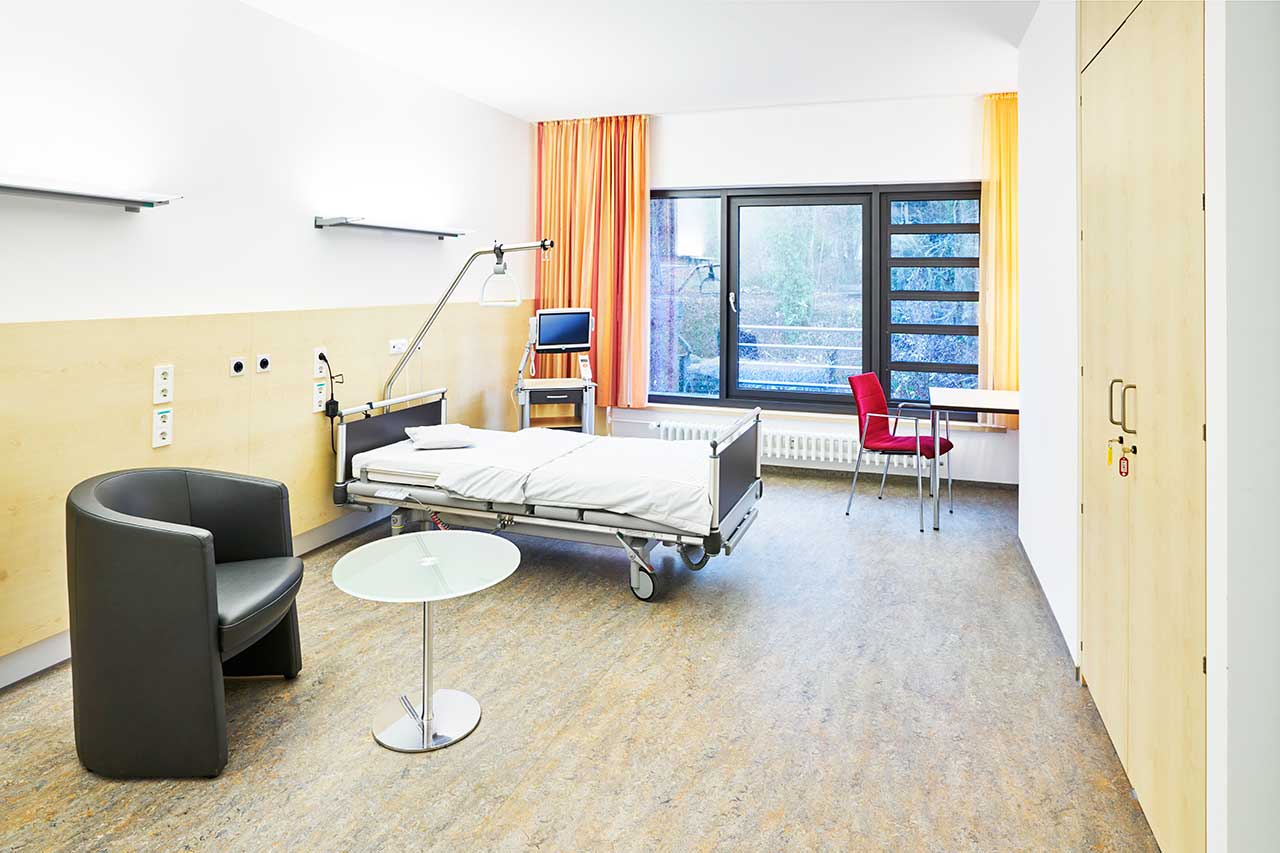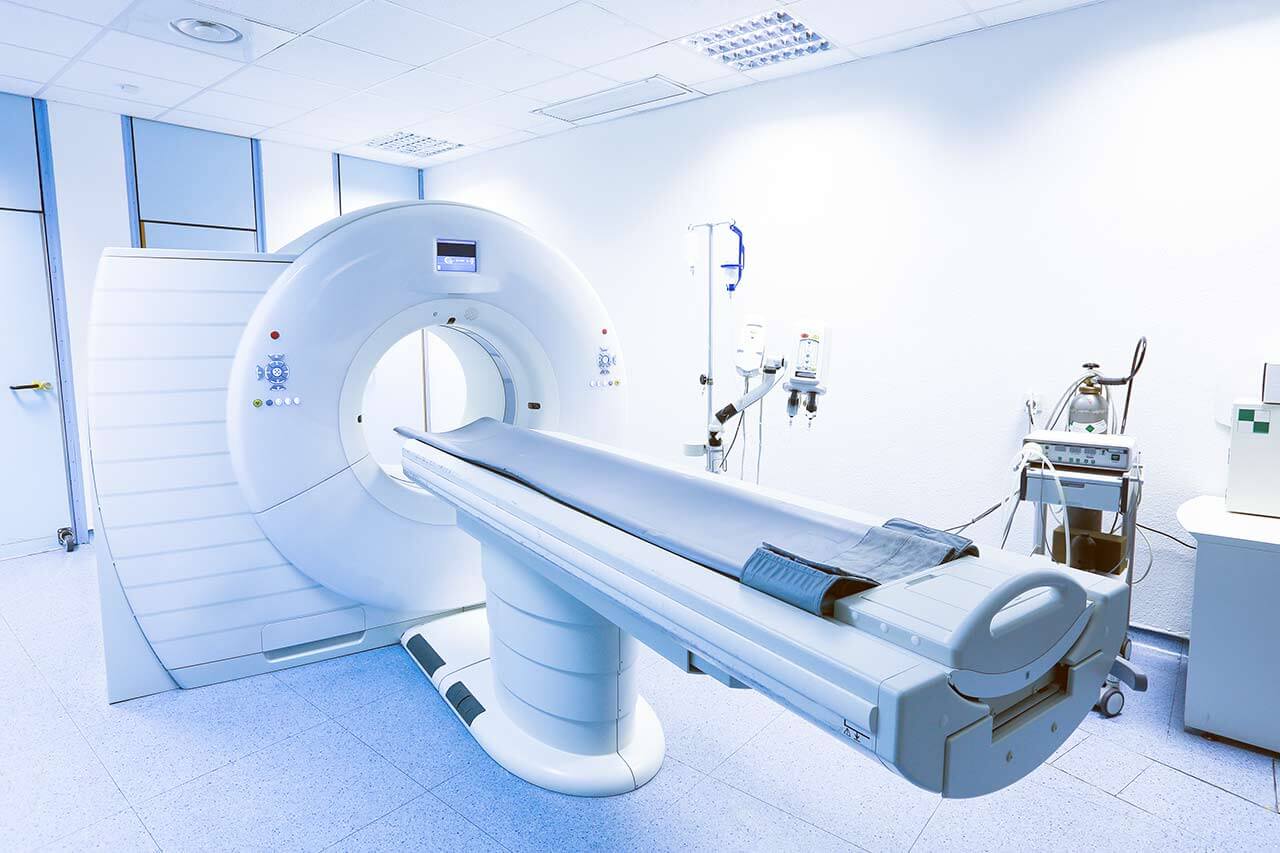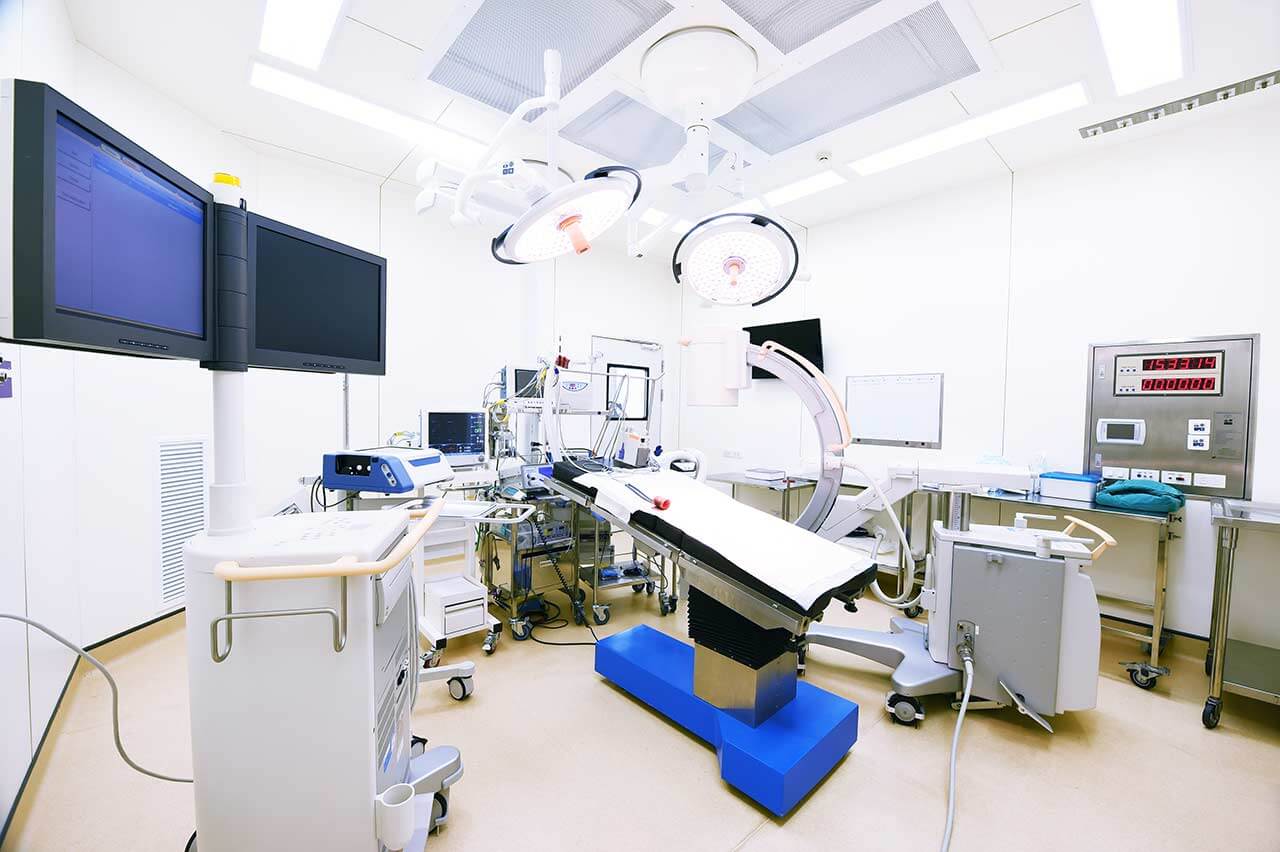
The program includes:
- Initial presentation in the clinic
- clinical history taking
- review of medical records
- physical examination
- urological examination
- laboratory tests:
- complete blood count
- general urine analysis
- biochemical analysis of blood
- inflammation indicators (CRP, ESR)
- indicators blood coagulation
- ultrasound pelvic rectal/ abdominal
- preoperative care
- transurethral splint
- symptomatic treatment
- control examinations
- the cost of essential medicines and materials
- nursing services
- full hospital accommodation
- explanation of future recommendations
Required documents
- Medical records
- Urethrography and urethroscopy (if available)
Service
You may also book:
 BookingHealth Price from:
BookingHealth Price from:
About the department
According to the Focus magazine, the Department of Adult and Pediatric Urology, Andrology at the University Hospital Erlangen ranks among the best departments in Germany specializing in prostate cancer treatment!
The department offers the full range of diagnostic and therapeutic services in the fields of its expertise. The department's medical team specializes in the treatment of diseases of the urinary tract in women and men, as well as in the treatment of pathologies of the reproductive system in adult men and children, andrological diseases in men. The primary focus of the clinical practice of the department's doctors is medical care for patients with kidney, bladder, ureteral, urethral, prostate, testicular and penile cancers. The department's specialists keep pace with medical innovations, so most surgical interventions are performed using sparing laparoscopic techniques that do not require large incisions in the skin and soft tissues. To treat prostate cancer, doctors successfully use robot-assisted prostatectomy with the da Vinci surgical system. This intervention has many advantages over classical surgery and is available only in the best hospitals in the world. In addition, the department's doctors demonstrate excellent results in the treatment of kidney stone disease, urinary incontinence and pelvic organ prolapse. A specially trained team of doctors has been formed for the treatment of urological pathologies in children. Of particular interest is the correction of congenital genitourinary anomalies in young patients. The Chief Physician of the department is Prof. Dr. med. Bernd Wullich.
Since July 2012, the department has been using the innovative da Vinci surgical system, which allows performing sparing surgical treatment of urological pathologies. The main advance in this area is robot-assisted prostatectomy. Performing such an operation with the da Vinci surgical system provides the patient with many advantages, such as shorter hospital stay, earlier extraction of the urinary catheter and restoration of normal urination, less severe pain syndrome, lower risk of infection and complications, and minimal blood loss. The intervention is indicated for patients with prostate cancer.
The department's therapeutic offer in the field of urologic oncology includes not only prostate cancer treatment. The urologists of the medical facility also provide medical care to the patients suffering from bladder, kidney, ureteral, urethral, testicular and penile cancers. The treatment is carried out in collaboration with oncologists, radiation therapists, radiologists and other related specialists. The treatment regimen for each cancer patient is developed at an interdisciplinary tumor board. The first-line therapy is usually surgical resection of the malignant tumor, but in many patients this monotherapy is not sufficient. To destroy the remaining malignant cells in the body and achieve remission, doctors additionally use chemotherapy, radiation therapy, immunotherapy, ablative methods, targeted therapy and other types of treatment. Cancer patients also receive highly qualified psychological support.
The treatment of urinary incontinence and pelvic organ prolapse is also an important focus of the department's clinical activities. Preference is always given to conservative therapeutic methods. These include drug therapy, special therapeutic exercises to strengthen the pelvic floor muscles, behavioral therapy, biofeedback, etc. If conservative methods do not give the desired result, doctors resort to surgery. The most effective interventions today are TVT and TVT-O sling procedures.
The diagnostics and treatment of urological diseases in children occupies an important place in the department's work. To carry out comprehensive examinations, doctors cooperate closely with the Departments of Pediatric and Adolescent Medicine, Radiology and Nuclear Medicine. The department's pediatric urologists most often deal with the surgical treatment of congenital malformations of the kidneys and urinary tract (for example, ureteral stenosis, megaloureter), endoscopic and non-surgical treatment of vesicoureteral reflux, treatment of bladder exstrophy, neurogenic urinary disorders, as well as surgical treatment of diseases of the internal and external genitalia (epispadias, hypospadias). The therapeutic options include the treatment of kidney and bladder tumors and the formation of an artificial bladder. The service range is also complemented by therapy for urgent urological conditions. Since January 2019, the Section of Pediatric Urology has been certified as a Training Center for Pediatric Urology by the European Board of Paediatric Urology (EBPU).
In the field of andrology, the department admits men with infertility, erectile dysfunction, hormonal disorders (testosterone deficiency), penile pathologies (phimosis and paraphimosis, penile curvature), testicular pathologies (varicocele, hydrocele). As a rule, the treatment of these pathological conditions involves the use of conservative methods.
The department's main clinical focuses include:
- Urology
- Diagnostics and treatment of urological cancers
- Prostate cancer
- Testicular cancer
- Penile cancer
- Bladder cancer
- Kidney cancer
- Ureteral and urethral cancer
- Diagnostics and treatment of benign urological diseases
- Benign neoplasms of the kidneys, bladder, urethra, ureter
- Benign prostatic hyperplasia
- Urinary tract infections in men
- Urinary and fecal incontinence, as well as functional disorders and diseases of the pelvic organs and pelvic floor in men and women
- Kidney stone disease
- Diagnostics and treatment of urological diseases in children
- Congenital malformations of the kidneys and urinary tract (ureteral stricture, megaureter, bladder and urethral malformations)
- Vesicoureteral reflux
- Emergency conditions in children (testicular torsion, epididymitis, paraphimosis)
- Kidney stone disease in children
- Diseases of the external genitalia (cryptorchidism, phimosis, varicocele)
- Hypospadias, epispadias, and intersex development of genitalia
- Exstrophy-epispadias complex
- Neurogenic urinary disorders (up to an enlarged bladder), for example, in spina bifida
- Tumors of the genitourinary system (for example, Wilms' tumor, rhabdomyosarcoma) in collaboration with specialists in pediatric oncology and radiation therapy
- Functional disorders of bladder emptying (enuresis, urinary incontinence in children)
- Diagnostics and treatment of urological cancers
- Andrology
- Diagnostics and treatment of andrological diseases in men
- Erectile dysfunction
- Male infertility
- Hormonal disorders in men
- Age-related changes in men
- Penile diseases
- Testicular disease
- Diagnostics and treatment of andrological diseases in men
- Other medical services
The department's range of surgical services includes:
- Prostatectomy with the da Vinci surgical system
- Bipolar electroresection for benign prostatic hyperplasia (TURP)
- Surgical removal of bladder tumors through the urethra (TUR-B) and photodynamic diagnostics, if required
- Minimally invasive stent implantation for urinary outflow disorders (for example, kidney stone disease)
- Endourologic stone removal from the bladder, ureters and kidneys with possible preliminary destruction
- Percutaneous removal of kidney stones with possible preliminary destruction
- Extracorporeal shock wave lithotripsy
- Conventional 3D laparoscopy
- Sclerotherapy for varicocele (Tauber operation)
- Surgical treatment of the foreskin narrowing (phimosis)
- Surgical treatment of hydrocele
- Surgery for suspected penile cancer (tissue biopsy for histological examination, plastic surgery, laser therapy)
- Surgery for pathological changes in the testicles and epididymis
- Other surgical options
Curriculum vitae
Higher Education and Professional Experience
- 1979 - 1985 Study of Medicine at the University of Freiburg.
- 1985 Doctoral thesis defense.
- 1987 - 1989 Education grant of the German Research Foundation (Germany and USA).
- 1995 Board certification in Human Genetics.
- 1998 Board certification in Urology.
- 1999 Venia legendi in Human Genetics, Adult and Pediatric Urology.
- 2003 Extraordinary Professorship.
- 2007 Invitation to the Chair of Urology at the Friedrich-Alexander University Erlangen-Nuremberg.
Memberships in Professional Societies
- American Association for Cancer Research.
- German Society of Urology.
- German Cancer Society.
- German Prostate Cancer Consortium.
- European Society of Urology.
- German Transplant Society.
Special Clinical Qualifications
- Organ preservation surgery for kidney cancer (open and minimally invasive).
- Nerve-preserving surgery for prostate tumors (open and minimally invasive).
- Bladder replacement surgery.
- Drug tumor therapy.
- Urethral surgery.
Special Scientific Qualifications
- Tumor genetics/epigenetics.
- Biomarkers.
- Evidence-based medicine.
- Biobanking (storing of biological samples).
Permission to Hold Upgrade Training Courses
- Permission to hold upgrade training courses in urology (for 5 years).
- Permission to hold upgrade training courses in special urologic surgery.
- Permission to hold upgrade training courses in X-ray diagnostics of the urinary tract.
- Permission to hold upgrade training courses in drug tumor therapy.
Photo of the doctor: (c) Universitätsklinikum Erlangen
About hospital
According to the Focus magazine, University Hospital Erlangen ranks among the best medical facilities in Germany!
The hospital is one of the leading healthcare facilities in Bavaria and offers top-class medical care distinguished by the close intertwining of clinical activities with research and training of medical students. The hospital was founded in 1815 and today is proud of its rich traditions, numerous medical achievements and an excellent reputation not only in Germany, but also in the international arena. The hospital has 25 specialized departments, 7 institutes and 41 interdisciplinary centers, whose experts work tirelessly for the benefit of their patients.
The hospital has the status of a maximum care center, and therefore it represents almost all fields of modern medicine. Oncology, transplant medicine, and robot-assisted surgery are among the top priorities of the clinical activities of the medical complex. Oncology is represented by the Comprehensive Cancer Center Erlangen, which is one of 13 centers of excellence in Germany certified by the German Cancer Society. The university hospital has a high-tech center with high success rates for heart, liver, kidney, pancreas, cornea and bone marrow transplants. In addition, the hospital is a leader in the use of robot-assisted surgery. The medical facility has at its disposal innovative robotic technologies, in particular the da Vinci Surgical System, with the help of which surgeons perform many sparing interventions in various medical fields.
The medical team of the hospital consists of highly professional therapists, surgeons and nursing staff. The focus of their efforts is on the patient, his health and peace of mind, as well as comfort during treatment. The clinical practice of doctors is based on an individual approach to each case, which results in high treatment success rates. State-of-the-art technical equipment also plays an important role in the therapeutic process. The hospital is proud of the most advanced devices for imaging diagnostics (X-ray, ultrasound, CT, MRI, PET-CT, SPECT-CT, etc.), endoscopic examinations, laboratory tests, as well as specially equipped operating rooms for robot-assisted interventions, image-guided therapeutic manipulations, minimally invasive and classical surgeries of any complexity. Thus, the doctors of the university hospital have all the necessary resources to effectively treat the most severe pathologies and save lives.
The combination of high-tech equipment, experienced and highly qualified personnel, as well as strict adherence to the standards of modern medicine, form a solid foundation for the provision of the best medical care at the European level. An undeniable proof of the high prestige of the hospital is the constantly growing number of patients who come here from various regions of Germany and other countries of the world.
Photo: (с) depositphotos
Accommodation in hospital
Patients rooms
The patients of the University Hospital Erlangen live in comfortable rooms with light colors and modern design. Each patient room has an ensuite bathroom with shower and toilet. The furnishing of the patient room includes an automatically adjustable bed with an orthopedic mattress, a bedside table, a wardrobe, a table and chairs for receiving visitors, a TV, a radio and a telephone. Wi-Fi can be provided upon request. The use of a mobile phone is prohibited in many rooms of the hospital.
Patients can also live in enhanced-comfort rooms with a more sophisticated design. The enhanced-comfort rooms additionally include upholstered furniture, a minifridge and a safe.
Meals and Menus
The hospital offers healthy and tasty food distinguished by many awards, including the 1st place in the prestigious ESSEN PRO GESUNDHEIT competition of the Bavarian State Ministry of the Environment and Consumer Protection.
The patient and the accompanying person have three meals a day. Breakfast is served buffet style: scrambled eggs, boiled eggs, sausage, cheese, bread and buns with butter and jam, cereals, etc. There are three set menus for lunch and dinner to choose from: a classic menu featuring local cuisine dishes, a Mediterranean menu and a vegetarian menu.
If for some reason you do not eat all the foods, you will be offered an individual menu. Please inform the medical staff about your dietary preferences prior to the treatment.
The hospital also houses many cafeterias, which will delight with a wide range of delicious dishes and drinks.
Further details
Standard rooms include:
Religion
The hospital regularly hosts catholic and evangelical devine services. The services of representatives of other religions are available upon request.
Accompanying person
During an inpatient program, an accompanying person can stay with you in the patient room or in a hotel of your choice.
Hotel
During an outpatient program, you can stay in a hotel of your choice. The managers will help you choose the most suitable options.




